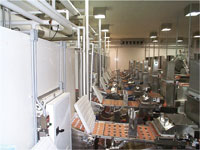Keystone Foods’ KeySTAR program puts spotlight on plant-level sustainability.

It’s said that virtue brings its own rewards. Sometimes, too, it also brings actual awards.
When global fast-food giant McDonald’s Corp. produced a 46-page “Global Best of Green 2009” report, it recognized Keystone Foods as one of several suppliers achieving measureable progress in sustainability, and further honored Keystone as “Sustainable Supplier of the Year.” Based in West Conshohocken, Pa., this private $6 billion company is a global protein processor and distribution services provider with 54 facilities in 14 countries.
“Although you will not see the Keystone brand on a supermarket shelf or in a restaurant, our company passionately supports many well-known and famous brands,” says Don Adams, Keystone Foods’ senior director of sustainability and new technology.
“Recognizing that sustainability is an important issue – both for us and for our customers – we examined our companywide capabilities a few years ago.”
He continues, “As with many processors, it was not a new topic to us. Keystone has a legacy of environmental stewardship, world-class food safety, best-in-class employee safety programs, and common–sense energy management.
“Even so, we wanted to build an active and ‘engaged’ sustainability program that would meet our customers’ growing needs and address stakeholder interests. We simply lacked a program to bring all the elements together in a cohesive, forward-looking approach.”
It was no small endeavor. For the record, officials say Keystone annually processes more than 1.7 billion pounds of poultry, about 400 million pounds of beef and nearly 33 million pounds of fish. It also provides full-service distribution to more than 40,000 restaurants worldwide. Keystone’s U.S. operations include three fully integrated poultry processing complexes, five poultry further processing plants, a frozen hamburger plant, a frozen fish portioning facility and four distribution centers.
Adams credits Keystone President & CEO Jerry Dean for driving the company’s sustainability initiative, starting in late 2007. With all business units involved, Keystone formed a global steering committee led by Ed Delate, vice president of engineering and corporate social responsibility; and John Vantine, vice president of risk management.
Adams says the committee developed plans for everything from metrics (what and how to measure), to communications and local team engagement. Keystone even trademarked its approach as “KeySTAR” – reflecting its goals of “Socially responsible growth,” “Total commitment,” “Achieving balance” and “Respecting the environment.”
One success story involves Keystone’s North Baltimore, Ohio, plant. One of the world’s largest beef grinding operations, officials say this facility (south of Toledo) produces nearly a million pounds of frozen hamburgers per day. Of course, there’s an equally impressive volume of raw beef (received fresh and/or frozen) arriving to the plant in corrugated cartons with plastic liners.
Adams says Bob Wilt, North Baltimore’s local KeySTAR team leader, encouraged North Baltimore employees to recycle all the corrugate and plastic that previously went to the local landfill.
“After aggressively pursuing various options, the plant has reduced the amount of waste going to the landfill by 80 percent, or about 4 million pounds per year, and the effort has expanded to electronic items, bottles and cans – as well as anything else the team can keep out of a landfill,” says Adams. “This accomplishment was recently recognized on a national level when the plant received one of the American Meat Institute’s (AMI) 2009 Environmental Achievement Awards for ‘Prevention Pollution.’”
Keystone earned similar acclaim at its fully integrated poultry operation in Camilla, Ga. Adams says water is the issue at this site, which processes more than 1 million birds per week.
KeySTAR leader Patrick Chastain led Camilla’s team to map process operations and learn (1) where water was used, (2) how that use might be reduced or (3) if the water could be reused. Adams says Camilla since has reduced annual water consumption by 20 percent – saving more than 25 million gallons per year – thanks to KeySTAR mechanical improvements (such as flow-reducing nozzles and more efficient chillers) and behavioral changes due to increased awareness.
For its efforts, AMI also recognized Camilla with a 2009 Environmental Achievement Award for “Resource Conservation.”
Behind the scenes, Adams says Keystone Foods created a Corporate Social Responsibility (CSR) program – to include sustainability initiatives and elements of social responsibility and accountability. He adds that Keystone is one of only a few private companies to publish a CSR Report according to guidelines set by Global Reporting Initiative.
Keystone also became a founding member of The Sustainability Forum, an exchange group where members from various industries share ideas and best practices.
“It is not rare for some to ask, ‘Is it worth it?’ But echoing the words of Jerry Dean, we believe ‘it just makes good sense,’” says Adams. “For years, we have measured employee satisfaction in various areas . . . We fully expect Keystone employees will feel a definite pride in working for a company that takes sustainability seriously.”
He concludes, “Through constant efforts to improve and enhance KeySTAR, we hope to assure a competitive advantage and clearly exhibit added value for our customers. We take the program seriously and now we’re seeing evidence that it’s being taken seriously in the marketplace. We’re proud to have earned a 2009 Sustainable Supplier of the Year Award from a major customer.”
At a glance
Company: Keystone Foods LLC
Food plant(s) honored: Group recognition for all U.S. operations
Selection criteria: Environmental initiatives
Employees: N.A.
Facility size: N.A.
Products: Frozen poultry, beef, seafood